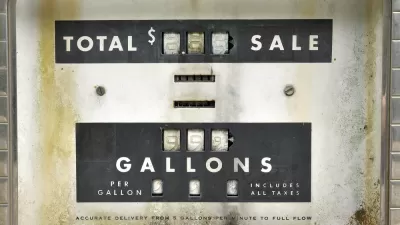With the Crimean referendum just days away, President Obama hopes that economic sanctions will cause Russia to back-off its threatened annexation from Ukraine. However, Europe may be unlikely to go along due to it's dependence on Russian natural gas.
"Roughly one third of all Europe's natural gas arrives via pipeline from Russia, and the current standoff in the Crimea has European leaders worried about the reliability of energy supplies. Energy analyst Joe Stanislaw from Deloitte LLP tells host Steve Curwood that energy insecurity may prompt some European countries to explore domestic fossil fuel extraction," states the introduction to the Living on Earth feature, "The Crimean Conflict and Energy." [Download here.]
However, the pipeline flows two ways, figuratively speaking. "Russia needs the European gas market. Almost 90 percent of all Russian gas exports go to Europe," states Stanislaw, so economic sanctions, if Europe were to go along, could have a powerful effect.
In fact, Stanislaw sees similarities to the Arab oil embargo of 1973 being the driving force for America to achieve "energy security" in terms of producing more of its own oil - which thanks to new extraction technology, is on course to achieving.
Could Europe apply fracking to its own natural gas shale formations to increase production as has been done in the U.S.? That possibility is discussed by NPR reporter Christopher Werth [listen here].
Many Europeans regard the U.S. boom in shale gas with trepidation. While France and Bulgaria have even banned fracking, others look at the U.S. with envy, says Julian Lee of the Centre for Global Energy Studies in London.
Energy analyst Pavel Molchanov sees a silver lining for Europe in the Crimean crisis. It "is just another reason for European countries to develop their own shale gas industries, Molchanov says." However, there are reasons why fracking works in the U.S. and might not in Europe. Take property rights, for example.
In the U.S., landowners own the rights to the minerals under their property, says Paul Stevens, an energy expert at Britain's Royal Institute of International Affairs. If Stevens owned a piece of American land and a company wants to drill, he says he'd be all ears.
"If you discover any shale gas, it's mine," Stevens says. "I get a slab of the action. In Europe, the subsoil minerals are the property of the state, not the landowner. So all the benefits and profits go to the governments."
Others see opportunities in the U.S. to loosen restrictions of natural gas exports to Europe and Ukraine. Both Sen. Mark Udall (D-Colo.) and his Republican challenger for his seat this year, Rep. Cory Gardner, have introduced bills to "amend a provision of the Natural Gas Act to allow for approval of natural gas to World Trade Organization member countries. Ukraine and surrounding countries make the cut," writes The Hill's Laura Barron-Lopez.
In a related article, she writes that "Central European countries are asking U.S. lawmakers to expedite natural gas exports in an effort to curb Russian President Vladimir Putin's power." A New York Times article discusses that possibility, indicating that the boom in U.S. natural gas production may allow for a new era of "American energy diplomacy".
FULL STORY: The Crimean Conflict and Energy

Trump Administration Could Effectively End Housing Voucher Program
Federal officials are eyeing major cuts to the Section 8 program that helps millions of low-income households pay rent.

Planetizen Federal Action Tracker
A weekly monitor of how Trump’s orders and actions are impacting planners and planning in America.

The 120 Year Old Tiny Home Villages That Sheltered San Francisco’s Earthquake Refugees
More than a century ago, San Francisco mobilized to house thousands of residents displaced by the 1906 earthquake. Could their strategy offer a model for the present?

HSR Reaches Key Settlement in Northern California City
The state’s high-speed rail authority reached an agreement with Millbrae, a key city on the train’s proposed route to San Francisco.

Washington State Legislature Passes Parking Reform Bill
A bill that would limit parking requirements for new developments is headed to the governor’s desk.

Missouri Law Would Ban Protections for Housing Voucher Users
A state law seeks to overturn source-of-income discrimination bans passed by several Missouri cities.
Urban Design for Planners 1: Software Tools
This six-course series explores essential urban design concepts using open source software and equips planners with the tools they need to participate fully in the urban design process.
Planning for Universal Design
Learn the tools for implementing Universal Design in planning regulations.
Ada County Highway District
Clanton & Associates, Inc.
Jessamine County Fiscal Court
Institute for Housing and Urban Development Studies (IHS)
City of Grandview
Harvard GSD Executive Education
Toledo-Lucas County Plan Commissions
Salt Lake City
NYU Wagner Graduate School of Public Service



























